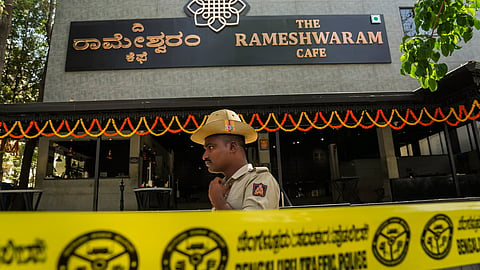

BENGALURU: The National Investigation Agency (NIA) has charge-sheeted four accused, Mussavir Hussain Shazib, Abdul Matheen Ahmed Taaha, Maaz Muneer Ahmed, and Muzammil Shareef in connection with the Rameshwaram Cafe blast case.
The charge sheet, filed on Monday, includes accusations under several laws, including the Indian Penal Code (IPC), the Unlawful Activities (Prevention) Act (UAPA), the Explosive Substances Act (ESA), and the Prevention of Destruction & Loss (PDLP) Act. All four accused, who were previously arrested, remain in judicial custody.
The improvised explosive device (IED) explosion occurred on March 1 this year at the Rameshwaram Café in Brookfield, ITPL Bengaluru, resulting in injuries to nine people and significant damage to the property.
The NIA, which began its investigation on March 3, conducted extensive technical and field investigations in collaboration with various state police forces and other agencies.
The probe revealed that Shazib had planted the bomb. He and Taaha had been evading capture since 2020 after the Al-Hind module was dismantled. They were apprehended from a hideout in West Bengal 42 days after the cafe explosion.
NIA in a statement stated that Shazib and Taaha, both from Shivamogga district, were ISIS radicals who had previously conspired to migrate to ISIS territories in Syria. They were involved in radicalizing other youth to ISIS ideology, with Ahmed and Shareef being among the targeted individuals.
The agency also noted that Taaha and Shazib used fraudulent Indian SIM cards, bank accounts, and various identity documents obtained from the Dark Web.
Taaha was introduced to Mohammed Shaheed Faisal, an absconder in the Lashkar-e-Taiba (LeT) Bengaluru conspiracy case, by ex-convict Shoaib Ahmed Mirza. Faisal was then introduced to Mehaboob Pasha, an accused in the Al-Hind ISIS module case, and Khaja Mohideen, Amir of ISIS South India, as well as to Ahmed.
Funds for the operation were provided via cryptocurrencies, which Taaha converted to fiat currency using Telegram-based peer-to-peer platforms. These funds were utilized for several violent acts in Bengaluru, including a failed IED attack at the State BJP office in Malleshwaram on January 22 this year, coinciding with the Pran Pratishtha ceremony at Ayodhya. The planning for the Rameshwaram Café blast followed these incidents, according to the NIA.